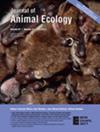蜜蜂的恐惧反应由多巴胺介导并影响认知。
IF 3.5
1区 环境科学与生态学
Q1 ECOLOGY
引用次数: 0
摘要
捕食性威胁即使不涉及直接消费(非消费性影响,NCE),也会对猎物的生理和行为产生深远影响。例如,蜜蜂遇到大黄蜂捕食者时会表现出类似于恐惧的反应。然而,与这种类似恐惧的反应有关的生理机制及其对蜜蜂认知和嗅觉的影响在很大程度上仍不为人所知。我们的研究表明,蜜蜂在大黄蜂附近停留的时间减少,表现出恐惧行为,并以更快的速度逃离。在长时间接触大黄蜂 24 小时后,蜜蜂会采取防御性集群,表现出更大的避开捕食者的行为,大脑多巴胺水平也会下降。长期暴露于捕食者也会降低蜜蜂对气味的嗅觉灵敏度以及对气流的机械灵敏度,从而导致嗅觉学习能力受损。然而,提高大脑多巴胺水平可以逆转一种类似恐惧的行为(蜜蜂在大黄蜂面前的平均速度),并挽救嗅觉灵敏度和学习能力。因此,我们提供了多巴胺与昆虫恐惧相关的感官和认知能力下降有关的证据。本文章由计算机程序翻译,如有差异,请以英文原文为准。

Bee fear responses are mediated by dopamine and influence cognition
求助全文
通过发布文献求助,成功后即可免费获取论文全文。
去求助
来源期刊

Journal of Animal Ecology
环境科学-动物学
CiteScore
9.10
自引率
4.20%
发文量
188
审稿时长
3 months
期刊介绍:
Journal of Animal Ecology publishes the best original research on all aspects of animal ecology, ranging from the molecular to the ecosystem level. These may be field, laboratory and theoretical studies utilising terrestrial, freshwater or marine systems.
 求助内容:
求助内容: 应助结果提醒方式:
应助结果提醒方式:


